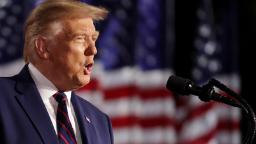“They are coming after me because I am fighting for you, that’s what’s happening,” Trump said while accepting the GOP nomination. “It’s been going on from before I even got elected. And remember this, they spied on my campaign and they got caught. Let’s see now what happens.”
That is not what happened. There are snippets of truth, like the fact that some Trump aides were investigated and surveilled by the FBI. But Trump’s exaggerated retelling has become so ubiquitous that it’s taken as fact among his political allies and right-wing media cheerleaders.
“Trump is successful in heralding back to an era when there was significant distrust of the Justice Department and FBI under Hoover,” said CNN national security analyst Juliet Kayyem. “He’s playing with that distrust. This is something for people who view government as the problem, which includes a lot of his supporters. This idea is consistent with their philosophy.”
Here’s a breakdown of the facts behind Trump’s “spying” claims, the parts that are flat-out conspiracy theories, and the kernels of truth that are buried underneath his allegations.
- Trump’s claims against Obama and Biden don’t stand up to scrutiny. The events of 2016 are one of the most scrutinized events in modern history. CNN previously examined thousands of pages of official reports, interview transcripts and court filings, and found no evidence that Obama or Biden ordered any government surveillance of Trump aides.
- The FBI wiretapped a former Trump campaign adviser. The FBI secured court approval to wiretap Carter Page after he left the Trump campaign. Page was a person of interest because of his travel to Moscow and ties to known Russian spies. A bipartisan Senate report released last week said the FBI’s initial interest in Page was “justified.”
- There were problems with the Page wiretaps. The FBI problematically relied in part on uncorroborated information from the “Steele dossier” to secure court approval for the wiretaps. The Justice Department inspector general found significant mistakes and errors with this process, and the FBI now admits that two of the four warrants were invalid. But the watchdog’s report did not find that the surveillance was part of a plot to sabotage Trump.
- The FBI sent informants to meet Trump associates. The FBI used undercover informants to investigate some Trump campaign aides with questionable ties to Russia. This is a routine technique in counterintelligence investigations, and it was lawful. But it does raise questions about how aggressively the FBI should scrutinize political campaigns.
- Spies were not implanted inside the Trump campaign. After conducting an extensive review, the Justice Department inspector general determined that the FBI did not implant spies inside Trump’s campaign, dismissing a conspiracy that Trump repeatedly promoted. The watchdog also said the FBI never tried to recruit campaign staff to become informants.
- There is no proof of improper “unmasking.” Trump’s “spying” claims also include allegations that senior Obama administration officials, including Biden, spied on Trump aides by improperly “unmasking” their anonymized identities in routine surveillance reports. The Trump administration declassified records about this practice, but the new information didn’t reveal any wrongdoing, and even confirmed that all “unmasking” requests followed proper protocol. According to official statistics, there has been more unmasking under Trump than under Obama.
- The FBI observed Flynn at a private briefing. In August 2016, US officials gave intelligence briefings to both presidential campaigns. For the Trump briefing, the FBI sent a top counterintelligence official so they could passively observe Trump adviser Michael Flynn. This was done because Flynn was already under investigation for his Russian ties. The Justice Department watchdog said this was a possible breach of trust with the campaign.
- Most experts reject Trump’s “spying” terminology. Few outside the pro-Trump orbit embrace his “spying” claims, because the phrase implies illegal surveillance, which was not the case here. FBI Director Christopher Wray, a Trump appointee, disputes the term, even while acknowledging that there were issues with some of the surveillance warrants.
- There weren’t Trump Tower wiretaps. Trump shocked the world in March 2017 by falsely accusing Obama of “tapping my phones” to snoop on his 2016 campaign. The Justice Department acknowledged later that year that it didn’t have any evidence supporting Trump’s claims. The inspector general reached the same conclusion in 2019.
But the Trump campaign didn’t provide any evidence backing up Trump’s assertion that Obama oversaw a massive “spying” conspiracy against him. The evidence simply doesn’t exist. Trump would be on firm footing if he stuck to the known wrongdoing that has been factually established.
Nonetheless, Trump’s deceptive slogans will live on as he continues fighting for reelection.
